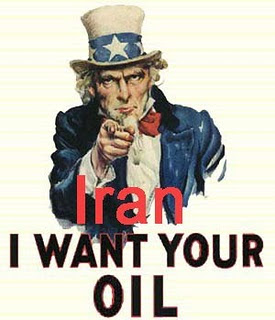
With globalization being the intensification of worldwide interconectedness associated with the increased speed and magnitude of cross-border flows of trade, investment, and finance, and migration, cultural diffusion, and communication, Iran has formulated a law permitting foreign investment with one hundred percent ownership of any firm in the country.
In the nineteenth century, Iran became dependent on Western economy. The rush of mass-manufactured goods into Iran destroyed some of the traditional handicrafts (such as cotton textiles) due to Iran's cheap importation of local manufactured goods. British merchants encouraged Iran landowners to increase crops such as cotton and tobacco. This lead to a series of famines because of the unavailability of wheat and other edible grains. However, Iran intergrated into the world system in the twentieth century. Iran became dependent on only one commodity- oil. Iran's exportation of oil defines it's country as a rentier state (a country that has an advantageous income by exporting raw materials or natural resouces to foreign companies).
The Islamic Republic was hoping for a rapid economic development and becoming fully dependent on oil and the West. Under the Iranian Republic, Iran's oil revenues became affected not only by the war in Iraq but also its failure to raise production. In order to raise oil production, Iran needs a rush of capital and new technology that is only found in the West. This pushed the Iranian Republic to change it's policy to foreign investment. The regime that supported self-sufficiency at the time became in debt with foreign banks and governments which forced them to continue renegotiating foreign loans constantly.
In the nineteenth century, Iran became dependent on Western economy. The rush of mass-manufactured goods into Iran destroyed some of the traditional handicrafts (such as cotton textiles) due to Iran's cheap importation of local manufactured goods. British merchants encouraged Iran landowners to increase crops such as cotton and tobacco. This lead to a series of famines because of the unavailability of wheat and other edible grains. However, Iran intergrated into the world system in the twentieth century. Iran became dependent on only one commodity- oil. Iran's exportation of oil defines it's country as a rentier state (a country that has an advantageous income by exporting raw materials or natural resouces to foreign companies).
The Islamic Republic was hoping for a rapid economic development and becoming fully dependent on oil and the West. Under the Iranian Republic, Iran's oil revenues became affected not only by the war in Iraq but also its failure to raise production. In order to raise oil production, Iran needs a rush of capital and new technology that is only found in the West. This pushed the Iranian Republic to change it's policy to foreign investment. The regime that supported self-sufficiency at the time became in debt with foreign banks and governments which forced them to continue renegotiating foreign loans constantly.
Aucun commentaire:
Enregistrer un commentaire